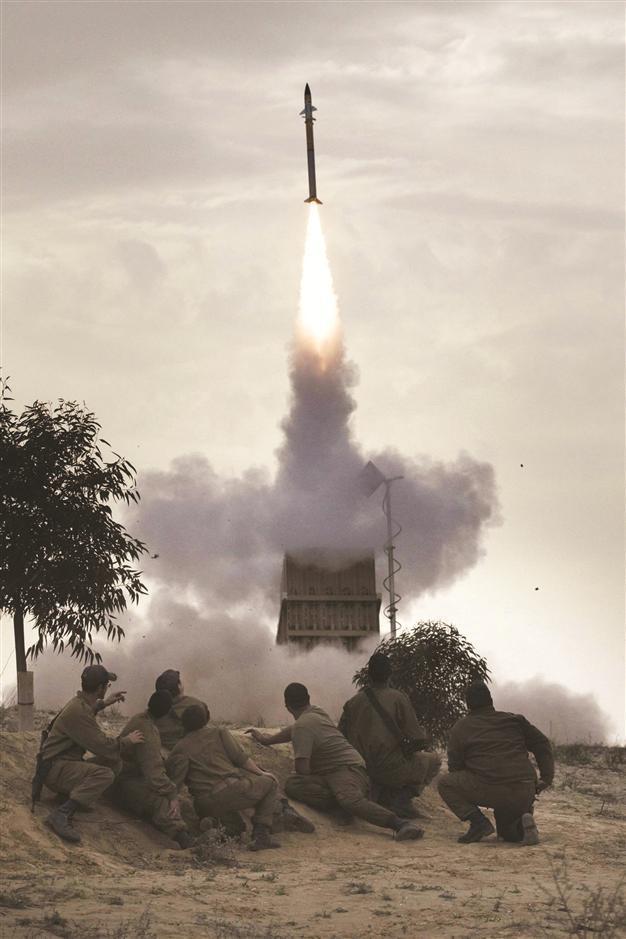United States to boost Iron Dome for Israel
WASHINGTON

Israeli soldiers watch as a missile is launched from the Iron Dome in the southern Israeli city of Beer Sheva on March 12. The system, the first of its kind in the world, was developed by Israel’s Rafael Advanced Defense Systems with the help of US funding. AFP photo
The
Pentagon has announced it will request funding to expand Israel’s “Iron Dome” short-range air defense system, a boost for Israel as the Obama administration tries to dissuade the Mideast ally from launching a potential unilateral strike on
Iran.
“Supporting the security of the state of Israel is a top priority of President Obama and Secretary (Leon) Panetta,” Pentagon press secretary George Little said in a statement. The United States spent $205 million on the Iron Dome system in fiscal year 2011, but the Pentagon statement provided no specific numbers for 2012. However, congressional aides said a possible request would be the purchase of 10 battery systems at a cost of $50 million each. Obama’s budget for next year calls for $3.1 billion in military assistance for Israel, the most for any foreign country.
“The Department of Defense has had conversations with the Government of Israel about U.S. support for the acquisition of additional Iron Dome systems and intends to request an appropriate level of funding from Congress to support such acquisitions, based on Israeli requirements and production capacity,” Little said.
Three batteries of the sophisticated system performed successfully during a rocket barrage by Gaza militants on the weekend of March 10-11, according to Israeli and U.S. officials. “When nearly 300 rockets and mortars were fired at southern Israel, Iron Dome intercepted over 80 percent of the targets it engaged,” the Pentagon’s statement said.
Each interception $25,000The request comes against the backdrop of growing concern in Washington about a possible Israeli strike against Iran aimed at halting or slowing work on its nuclear program, as well as the worst flare-up of violence along Israel’s southern border in months. The Obama administration has argued against military strikes on Iran for now, saying there is still time for diplomacy.At the same time, Obama is eager to show support for Israel’s defense needs, particularly in an election year. Obama won nearly eight of every 10 Jewish votes in 2008 but a slip could jeopardize his November 2012 re-election drive.
Some Republicans in Congress have accused Obama of failing to show sufficient support to Israel but lawmakers immediately praised the defense system move. The system, the first of its kind in the world, was developed by Israel’s Rafael Advanced Defense Systems with the help of U.S. funding. It is designed to intercept rockets and artillery shells fired from a range of four to 70 kilometers. Industrial sources put each interception cost at around $25,000. Each battery comprises detection and tracking radars, state-of-the-art fire control software and three launchers, each with 20 interceptor missiles.
Compiled from AFP, AP and Reuters stories by the Daily News staff.
Australia may allow US spy flights in Indian Ocean
CANBERRA - Reuters
Australia could one day allow U.S. spy flights to operate from a remote Indian Ocean island, Defense Minister Stephen Smith confirmed yesterday, supporting the U.S pivot to Asia but likely upsetting Australia’s biggest trading partner, China.
Smith said the possible use of Australia’s remote Cocos Islands territory had been raised with the United States, but the proposal was not under active consideration and was not among current plans for Canberra to strengthen military ties with Washington. “We view Cocos as being potentially a long term strategic location. But that is down the track,” Smith told reporters yesterday. The Washington Post said the Pentagon was interested in using Cocos Islands, a series of atolls about 3,000 kilometers west of Australia and south of Indonesia, as a new base for surveillance aircraft and allowing spy flights over the South China Sea.
nuke,
